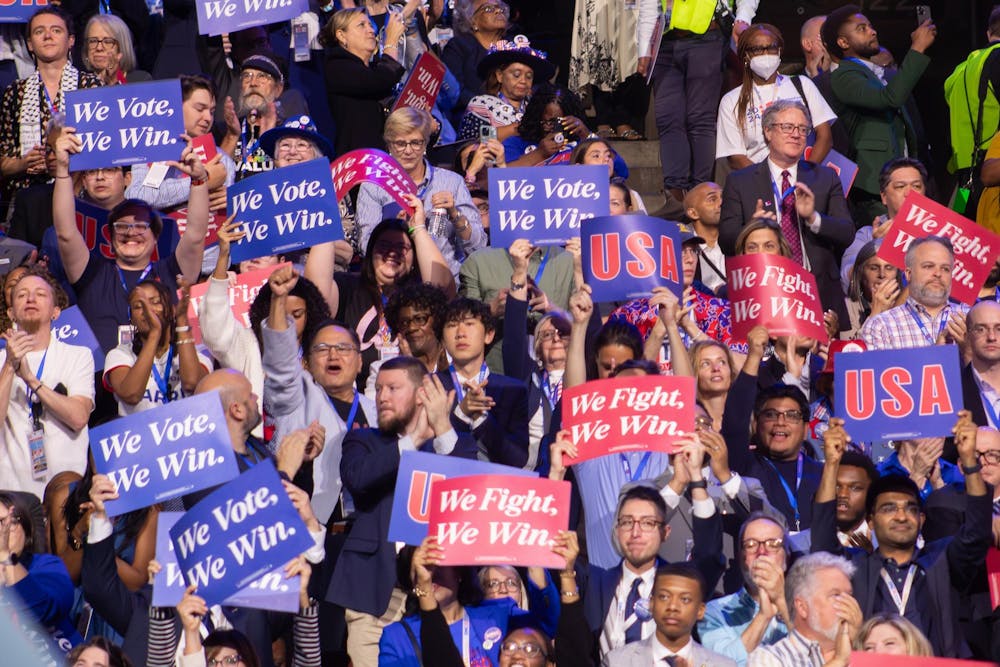This story is part of the IDS’ national convention coverage. Follow reporter Andrew Miller on X and IDS social media for updates.
CHICAGO — As the Democratic National Convention wraps up, Kamala Harris’ campaign is steadily releasing more information on her plan for the economy, the number one issue for Americans.
Experts say the economy is doing well as a whole. But post-pandemic price jumps in necessities like groceries — which jumped roughly 20% — still disproportionately hurt people with lower incomes.
Phil Powell, an IU Kelley School of Business professor, said that’s hurt Bloomington more than most of Indiana, in part due to the city’s large student population. Students without families able to support their living expenses are financially struggling, Powell said.
The rise in prices has also harmed lower-income individuals and families in Bloomington, who face rents already topping national indexes. Bloomington’s poverty rate excluding students, Powell said, is around the same as Indianapolis’ — almost 16% in 2022.
However, there are still positive indicators — Powell said Bloomington’s economy is “actually pretty solid.” Bloomington metropolitan area wages, at least in private employment, have grown significantly after the pandemic.
But combating price increases, and even lowering prices, have topped the list of political promises this election. And it’s led to one of the Harris campaign’s more controversial policy proposals, a federal ban on price gouging in food and grocery industries.
There are still very few details on Harris’ plan. But the New York Times reported, with unnamed sources, that it could resemble price gouging bans enacted by many states — for example, making price jumps on shovels before a blizzard illegal.
Indiana has a similar law, banning price increases on fuel that “grossly exceeds” the average price during and 24 hours before a state of emergency declaration. Indiana’s attorney general can seek $1,000 in civil penalties per violation, along with restitution for customers.
It’s unclear how the proposal, which people familiar with the plan reportedly told the Times “would likely be reserved for emergency situations,” would actually impact prices.
Still, Powell said, most economists do not like the concept of price controls, which often lead to shortages in practice.
He said he sees the logic in the proposal in today’s heated political climate surrounding inflation, deeming the messaging “gamesmanship.” Research does show that messaging surrounding bans on price gouging does increase voter favorability.
“But you can’t legislate prices,” Powell said.
The policy on inflation, overall, is largely determined by the Federal Reserve, which sets the money supply, regulates financial markets and determines interest rates through the federal funds rate. Rates, now at 5.25-5.5%, are relatively high and have stayed this high for a year.
Higher interest rates make borrowing money more expensive, which constricts an expanding economy’s growth. It is the government’s primary way to combat inflation, Powell said, which has held low for several months in a row — an annualized 2.9% in July.
The Fed is supposed to operate without political influence. The president can fire the agency’s chair, though that has never happened in history. A president can also nominate chairs after their four-year term expires, though candidates have to go through senate confirmation.
Former President Donald Trump has said he would try to set monetary policy, though he walked back that comment.
Regardless, the main lever on employment and inflation lies with the Fed, which is expected to cut rates in September. That could result in lower borrowing rates, mortgage rates and increase consumer spending.
Especially after a recent downward jobs revision, some economists say that the U.S. is headed for a recession, meaning higher unemployment and stifled growth. However, Powell said he doesn’t see any indicators of an upcoming recession.
Still, unemployment has edged up in recent months. And it’s higher than the national average in the Bloomington metropolitan area. Preliminary figures put unemployment — which typically rises over the summer — at 5.2% for June, the highest since August 2020.
Harris’ other economic plans largely impact higher-income individuals — such as a 25% minimum income tax on individuals with a wealth of more than $100 million. Powell said there are not many of them in Bloomington or the surrounding areas.
Another Harris campaign proposal targets building new homes. That could incentivize more construction in Bloomington, where housing remains difficult to afford for many low-income residents. Harris’ plan proposes 3 million new homes, along with up to $25,000 in support for first-time home buyers’ down payments. However, there aren’t many more specifics.
Harris also wants to implement a $3,600 tax credit per child, along with a $6,000 credit for newborns. Many other economic policies are continuations of Bidens, including reducing drug costs and canceling medical debts.
— Andrew Miller covers politics and elections for the Indiana Daily Student. Contact him at ami3@iu.edu, or direct message via X.




